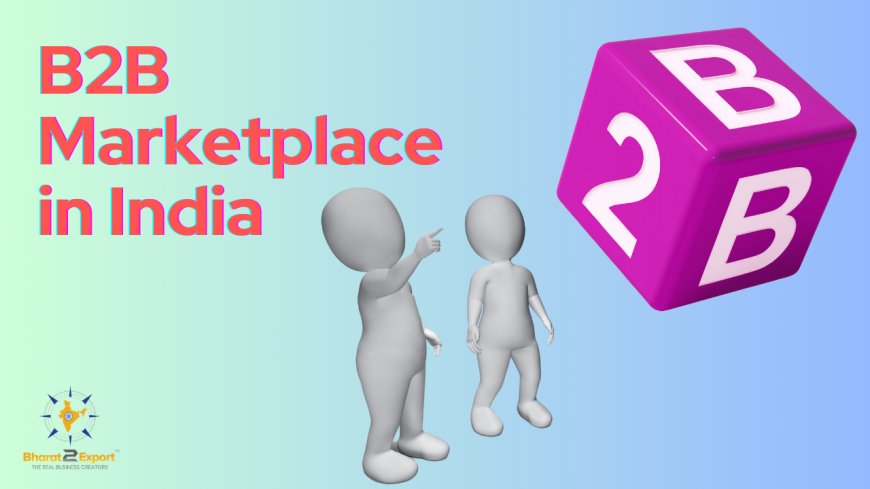How does a B2B marketplace in India ensure the authenticity of suppliers?

A B2B marketplace in India plays a pivotal role in connecting businesses, streamlining transactions, and fostering trust between buyers and suppliers. The authenticity of suppliers is a cornerstone of these platforms, ensuring that businesses can confidently engage in trade without the fear of fraud or subpar products. Let's explore the multifaceted approaches these marketplaces adopt to guarantee the legitimacy of their suppliers.
Comprehensive Supplier Verification
Document Verification
One of the primary steps in ensuring supplier authenticity is thorough document verification. This includes checking business licenses, registration certificates, tax identification numbers, and other relevant documentation to confirm the supplier's legitimacy.
Background Checks
Conducting detailed background checks on suppliers helps in identifying any previous fraudulent activities or legal issues. This process involves scrutinizing the supplier’s history, market reputation, and financial stability.
On-site Inspections
On-site inspections are another effective method. Representatives from the B2B marketplace in India visit the supplier’s premises to verify the existence of the business, the quality of the infrastructure, and the operational capabilities.
Quality Assurance Programs
Product Sampling
To ensure the products meet the required standards, B2B marketplaces in India often request product samples. These samples undergo rigorous testing to assess their quality and compliance with industry standards.
Third-Party Audits
Engaging third-party audit firms to conduct periodic reviews and inspections ensures an unbiased evaluation of the supplier's practices and products. These audits provide an additional layer of credibility and trust.
Transparent Supplier Profiles
Detailed Listings
B2B marketplaces maintain detailed supplier profiles that include comprehensive information about their products, services, certifications, and past transactions. This transparency allows buyers to make informed decisions.
Customer Reviews and Ratings
Customer feedback plays a crucial role in validating supplier authenticity. Positive reviews and high ratings from previous buyers enhance a supplier's credibility, while negative feedback raises red flags.
Secure Transaction Mechanisms
Escrow Services
Many B2B marketplaces in India offer escrow services to protect both buyers and suppliers. Funds are held in escrow until the buyer confirms receipt and satisfaction with the goods, ensuring a fair transaction process.
Payment Gateways
Secure payment gateways are integral to maintaining trust. These gateways ensure that financial transactions are safe, reducing the risk of fraud and enhancing the overall security of the marketplace.
Advanced Technological Solutions
Blockchain Technology
Blockchain technology is revolutionizing the way B2B marketplaces in India ensure supplier authenticity. By creating immutable records of transactions and supplier histories, blockchain provides a transparent and tamper-proof system.
Artificial Intelligence (AI)
AI algorithms help in identifying patterns and anomalies that might indicate fraudulent activities. These systems continuously monitor supplier activities, flagging any suspicious behavior for further investigation.
Training and Education Programs
Supplier Training
Regular training programs help suppliers understand the marketplace's standards and expectations. Educated suppliers are more likely to adhere to guidelines, ensuring higher authenticity and quality.
Buyer Education
Educating buyers on how to assess supplier credibility and utilize the marketplace's verification tools empowers them to make safer purchasing decisions.
Partnerships and Collaborations
Industry Associations
Collaborating with industry associations and trade bodies helps B2B marketplaces in India access verified and reputable suppliers. These associations often have stringent membership criteria, adding an extra layer of trust.
Government Partnerships
Government collaborations enable marketplaces to cross-verify supplier information with official databases, enhancing the accuracy of their verification processes.
Continuous Monitoring and Evaluation
Regular Audits
Periodic audits of suppliers ensure continuous compliance with marketplace standards. These audits are crucial in maintaining the long-term authenticity of suppliers.
Feedback Mechanisms
Implementing robust feedback mechanisms allows buyers and other stakeholders to report any issues with suppliers promptly. This feedback is essential for ongoing supplier evaluation and improvement.
Compliance with International Standards
ISO Certifications
ISO certifications are a mark of quality and authenticity. B2B marketplaces in India encourage suppliers to obtain these certifications, which are globally recognized and respected.
Adherence to Trade Regulations
Ensuring suppliers comply with international trade regulations and standards is vital. This compliance not only guarantees authenticity but also facilitates smoother international transactions.
Conclusion
Ensuring the authenticity of suppliers in a B2B marketplace in India is a multifaceted process involving rigorous verification, technological advancements, and continuous monitoring. By adopting these comprehensive measures, these marketplaces create a secure and trustworthy environment for businesses to thrive. As the landscape of B2B commerce evolves, the emphasis on supplier authenticity will continue to be paramount, fostering greater confidence and collaboration in the global market.












